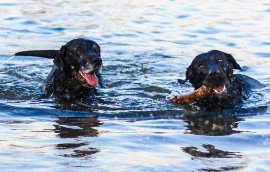 For many dog owners, spending time outdoors during the warmer months means being close to water. Whether it’s the family pool in the backyard, the leash-free dog beach, or jumping through a sprinkler, many dogs love to play in the water. Water activities with your dog are not only fun, they can be a great source of exercise and mental stimulation.
For many dog owners, spending time outdoors during the warmer months means being close to water. Whether it’s the family pool in the backyard, the leash-free dog beach, or jumping through a sprinkler, many dogs love to play in the water. Water activities with your dog are not only fun, they can be a great source of exercise and mental stimulation.
And while a day of fun and sun with your dog sounds like the best thing ever (which it is!), there are important considerations when it comes to water safety. When it’s warm, we need to keep our dogs well hydrated. That is common sense, of course. However, while most pet owners are mindful about dehydration, many do not consider the opposite. What happens to our dogs if they become overhydrated?
If you have a dog that loves to play in the water, it is important to know what water intoxication looks like, and what you should do about it.
Water intoxication, or hyponatremia, is a potentially fatal condition that commonly affects dogs with an affinity for water-based play. Whether it’s retrieving, swimming, or diving, these activities can result in the ingestion of dangerously large amounts of water. Dogs swimming in lakes, diving into pools, and retrieving toys are at greatest risk, however the same dangers apply to dogs who like to play with pressurized water from a hose or sprinkler.
When too much water has been consumed, the body begins to lose sodium. As a result, cells in the body begin to fill with water, causing swelling. If swelling were to take place in the brain, a dog may suffer potentially fatal damage to their central nervous system.
Dogs suffering from water intoxication may show the following symptoms:
-
Loss of balance and coordination
-
Confusion
-
Bloating
-
Vomiting
-
Profuse salivation
-
Lethargy
-
Glazed eyes
-
Breathing difficulties
-
Seizures
-
Loss of consciousness
-
Coma
Dogs can consume a massive amount of water in a short period of time, so water intoxication can progress quickly. It is critical to seek veterinary attention right away if your dog begins to show these symptoms after exposure to water. Veterinary treatments include IV of electrolytes, diuretics, and medication to reduce swelling, particularly in the brain. If veterinary care is given early enough, some dogs recover well from water intoxication, however the reality is many do not.
Water intoxication is a very time-sensitive situation, so be watchful of your dog when being active around or in the water. It is important to take periodic breaks away from the water. Dogs holding sticks or toys in their mouth while swimming are definitely going to intake more water, especially if the water is rough and wavy.
Even though it is not a common circumstance, water intoxication does affect many dogs every year. Let your dog have all the fun they want around the water, as long as it is safe and well monitored.
Brandon Forder – also known as The Pet Expert – is vice-president of Canadian Pet Connection, a family-owned and -operated business located in Meaford. He has over twenty-five years of experience specializing in pet nutrition, behaviour, and healthy pet lifestyles. Canadian Pet Connection is an industry leader committed to providing their clients with the highest levels of personal, attentive service. Learn more at www.CanadianPetConnection.ca.











